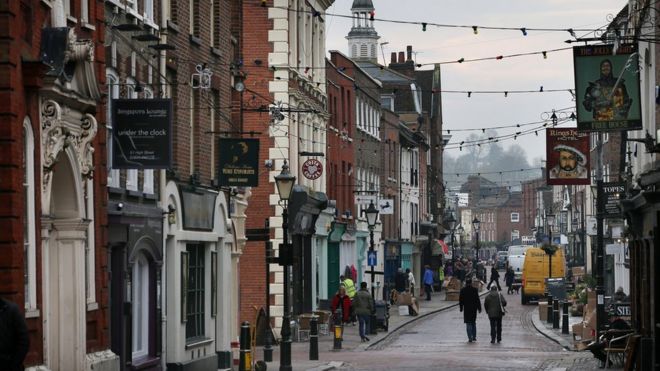
Business rates are a "ticking time bomb" for small companies in England which should be offered emergency help, the shadow business secretary has said.
Labour's Rebecca Long-Bailey said many firms faced "cliff-edge" rises when new valuations take effect in April and that the process had been mishandled.
The government says it has established a £3.6bn transitional fund to help businesses facing big jumps in rates.
A spokesman said the changes meant all businesses would get a "fair deal".
However, Ms Long-Bailey said: "The reality is that business rates are a ticking time bomb.
"It cannot be right for smaller town centre retailers to be facing massive hikes while the Amazons and ASOSs of this world have their business rates cut."
'20th century system'
Labour's plan would include a fund worth £150m a year for the next three years for small and medium-sized firms at risk of bankruptcy due to "sharp and unmanageable" increases.
It would be distributed by councils under already established powers to provide discretionary relief, with the cost covered by central government.
Analysis: Simon Jack, business editor
Although many businesses are expecting small falls in business rates in April, around a third are expecting very sharp rises, with a fifth - mainly in the South East - expecting a rise of more than 40% immediately - and that is AFTER a government plan to use £3.6 billion pounds saved by the winners to offset the pain of the losers.
The Federation of Small Business is warning than half of those facing hikes will reduce, postpone or cancel investment, with nearly a fifth considering closing down or selling up.
Revaluations happen every five years, but the 2015 reset was postponed ahead of the last general election - hence the severity of the moves. Many of the newest and biggest retailers like Amazon and Asos are expected to benefit from reductions in rates on their out-of-town sites.
The government has signalled it may find extra money to help the hardest hit. Many small business owners will be watching next week's Budget to see if it delivers.
In the long-term, Labour said the system should be fundamentally reformed to ease the burden on high streets and town centres.
Meanwhile, a survey of 675 members of the Federation of Small Business (FSB) found that almost a fifth of businesses facing higher rates may consider closing their doors.
The research suggested more than a third (36%) of small firms expected their rates to increase, with 44% expecting bills to eventually rise by more than £1,000 a year, and just over a fifth expecting an increase of more than 40%.
FSB national chairman Mike Cherry said profitability among small businesses was falling: "The costs of doing business for small firms are now at their highest levels since early 2014. The last thing we need is a business rates burden so heavy that it threatens the future growth prospects of our entrepreneurs."
On Monday Ms Long-Bailey will join shadow chancellor John McDonnell and shadow communities secretary Teresa Pearce for a discussion with business organisations including the FSB, British Retail Consortium and the British Chambers of Commerce.
Andrew Silvester, deputy policy director at the Institute of Directors, said: "This is a 20th century system and in a 21st century economy, it looks painfully out of date."
Labour also called for business rates to be indexed to the lower CPI measure of inflation rather than RPI and to exclude investment in plant and machinery from future business rates valuations.
Christopher Richards, of the Engineering Employers Federation, said: "The inclusion of plant and machinery in business rates bills represents a tax on productive investment and undermines the international competitiveness of UK manufacturing."
A government spokesman said: "The revaluation is designed to bring rates into line with changes in the rental property market and ensures business rate bills more closely reflect the property market and that all businesses are getting a fair deal."
